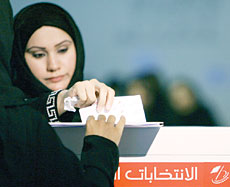MANAMA, 26 November 2006 — Bahrainis turned out in large numbers yesterday to cast their ballots in the parliamentary and municipal elections, amid early allegations by the largest Shiite opposition grouping of vote-tampering and rigging.
Polling centers opened across the Gulf state at 8 a.m. to allow more than 295,000 eligible voters to select their 2006-2010 parliamentary and municipal representatives 24 hours after the close of campaigning.
Following a joint inspection of the voting boxes by the center officials and the candidates, voters were allowed to cast their ballots within the first fifteen minutes of opening the 40 centers.
An additional ten general centers that allow voters to cast their ballots regardless of the constituency they are from also opened on time, despite earlier calls by the opposition to close them down for fear that they would be used to rig the results.
Al-Wefaq Islamic Society, the largest of the opposition groupings, claimed early on that officials at some of the centers were deliberately delaying voters to prompt them to use one of the ten general centers, which candidates cannot supervise.
The constituency of Al-Wefaq’s Secretary-General Sheikh Ali Salman, who is likely to be the next speaker of Parliament if elected, witnessed long waiting lines and delays.
His constituency in the Northern Governorate, where an estimated 15,000 voters reside, is one of the largest with voters there almost equaling the number of the total voters in the Southern Governorate.
Two other Al-Wefaq candidates, Sayed Hyder Al-Sitri and his municipal counterpart Sadiq Rabie, called on Justice Minister Mohammed Al-Sitri to immediately remove the supervising judge of the sixth constituency in the Central Governorate, claiming that he tampered with the votes.
Shortly after the Society reported that they contacted the same minister expressing similar concerns over a number of judges who they claimed to have voted against the wishes of elderly people they were assisting in placing their votes.
Al-Wefaq also alleged in two separate reports that buses were used to ferry dual-nationality holders from Saudi Arabia to cast their vote at the King Fahd Causeway Center and in other instances Ministry of Interior buses were used to transport enlisted members to a general polling station south of the country.
In both cases Al-Wefaq said that those voters were used to vote against their candidates.
About 200 independent local monitors are overseeing the elections process, but many of the representatives declined to comment before the election centers closed their doors.
The morning session of the 12-hour-long voting period was also marked by a strong turnout of women voters. According to official figures 148,358 of the 295,686 voters are women. A total of 207 parliamentary candidates, including 17 women, are competing to fill the 39 open seats in the 40-seat openly contested Parliament chamber.
Candidate Latifa Al-Qouhoud has already won one of the seats after she ran uncontested in her constituency, making her the first woman MP in the country’s history.
Forty other members will be appointed by Bahrain’s King Sheikh Hamad bin Isa Al-Khalifa, to the Shoura Chamber, which is the second house of the National Assembly.
Voters are also casting their ballots to select 40 municipal representatives out of 166 candidates, including five women, running to fill those seats.
Early elections for nationals residing or traveling abroad were held earlier in 22 Bahraini embassies, consulates and diplomatic missions. A second round, if required, will be held abroad on Tuesday and in Bahrain on Saturday.
This year’s elections are also the first time in the Gulf state’s history that political groupings are allowed to officially contest them, with six political societies already in the fray for the Bahraini ballots, which women voters have the larger share of. This is the second time that Bahrainis go to the polls in four years after the king introduced sweeping reforms following his rise to power in 1999, including the reintroduction of the short-lived parliamentary life that was suspended more than three decades earlier.


